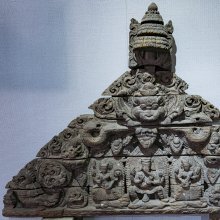Adha, Adhā: 14 definitions
Introduction:
Adha means something in Hinduism, Sanskrit, Buddhism, Pali, Marathi, Jainism, Prakrit, Hindi. If you want to know the exact meaning, history, etymology or English translation of this term then check out the descriptions on this page. Add your comment or reference to a book if you want to contribute to this summary article.
Images (photo gallery)
Languages of India and abroad
Pali-English dictionary
Source: Sutta: The Pali Text Society's Pali-English DictionaryAdha°, in cpds. like adhagga see under adho. (Page 27)

Pali is the language of the Tipiṭaka, which is the sacred canon of Theravāda Buddhism and contains much of the Buddha’s speech. Closeley related to Sanskrit, both languages are used interchangeably between religions.
Marathi-English dictionary
Source: DDSA: The Molesworth Marathi and English Dictionaryadha (अध).—n S Sin. 2 Fault, offence, crime.
--- OR ---
aḍhā (अढा).—m A turn (as round a post or stick) with a rope or string. 2 An intervolved or interlooped part (of a cord); a curl, a doubling. 3 Used pl aḍhē for aḍhēpāraḍhē.
--- OR ---
ādhā (आधा).—a (Poetry. H ardha S) Half.
Source: DDSA: The Aryabhusan school dictionary, Marathi-Englishaḍhā (अढा).—m A turn with a rope. A curl, doubling.
--- OR ---
āḍhā (आढा).—See under अ.
Marathi is an Indo-European language having over 70 million native speakers people in (predominantly) Maharashtra India. Marathi, like many other Indo-Aryan languages, evolved from early forms of Prakrit, which itself is a subset of Sanskrit, one of the most ancient languages of the world.
Sanskrit dictionary
Source: DDSA: The practical Sanskrit-English dictionaryAdha (अध) or Adhā (अधा).—ind. Ved. Used like अथ (atha) as an inceptive particle in the sense of 'now', 'then', 'afterwards', 'moreover', 'and', 'partly', 'so much the more' &c.
--- OR ---
Ādhā (आधा).—3 U.
1) To put, place, deposit, implant, lodge; ब्रह्मण्याधाय कर्माणि (brahmaṇyādhāya karmāṇi) Bhagavadgītā (Bombay) 5.1;8.12. जनपदे न गदः पदमादधौ (janapade na gadaḥ padamādadhau) R.9.4; Bhagavadgītā (Bombay) 5.1; दुष्यन्तेनाहितं तेजः (duṣyantenāhitaṃ tejaḥ) Ś.4.4; आहितो जयविपर्ययोऽपि मे (āhito jayaviparyayo'pi me) R.11.86 inflicted on me 19.26; संभृते शिखिनि गूढमादधुः (saṃbhṛte śikhini gūḍhamādadhuḥ) 19.54 consigned to the flames, burnt; धैर्यं चाऽऽधिषताधिकम् (dhairyaṃ cā''dhiṣatādhikam) Bhaṭṭikāvya 7.12 plucked up greater courage.
2) To apply, propose, fix upon, direct towards; प्रतिपात्रमाधीयतां यत्नः (pratipātramādhīyatāṃ yatnaḥ) Ś.1; मय्येव मन आधत्स्व (mayyeva mana ādhatsva) Bhagavadgītā (Bombay) 12.8; गमने मतिमाधत्त (gamane matimādhatta) Rām.; Ś.2.3; आधीयतां धैर्ये धर्मे च धीः (ādhīyatāṃ dhairye dharme ca dhīḥ) K.63 direct; सर्वकार्येष्वाहितमतिः (sarvakāryeṣvāhitamatiḥ) K.56.
3) To appropriate to oneself, hold, possess, take, carry, have, bear; भूयो बभौ दर्पणमादधानाम् (bhūyo babhau darpaṇamādadhānām) Kumārasambhava 7.26; आधत्ते कनकमयातपत्रलक्ष्मीम् (ādhatte kanakamayātapatralakṣmīm) Kirātārjunīya 5.39. takes or assumes; गर्भमाधत्त राज्ञी (garbhamādhatta rājñī) R.2.75,5.57; आहितक्रोधा (āhitakrodhā) Amaruśataka 21.
4) To bear up, uphold, support; शेषः सदैवाहितभूमिभारः (śeṣaḥ sadaivāhitabhūmibhāraḥ) Ś.5.4.
5) To cause, produce, create, rouse, excite (fear, wonder &c.); छायाश्चरन्ति बहुधा भयमादधानाः (chāyāścaranti bahudhā bhayamādadhānāḥ) Ś.3.26; Kirātārjunīya 4.12,6.19,8.46,57; Kumārasambhava 6.2; Bhaṭṭikāvya 2.8; विस्मयमादधाति (vismayamādadhāti) M.5.17; K.246; नवरसरुचिरां निर्मितिमादधती भारती (navarasarucirāṃ nirmitimādadhatī bhāratī) K. P.1; to put in, infuse; Śiśupālavadha 2.76.
6) To supply, give, impart (with dat., gen. or loc.); शुद्धिमादधाना (śuddhimādadhānā) R.1.85; इन्द्रं त्रैलोक्यमाधाय (indraṃ trailokyamādhāya) Mb.
8) To appoint; तमेव चाधाय विवाहसाक्ष्ये (tameva cādhāya vivāhasākṣye) R.7.2.
8) To consecrate (as fire); तत्राग्निमाधाय समित्समिद्धम् (tatrāgnimādhāya samitsamiddham) Kumārasambhava 1.57.
9) To perform, practise (as a vow &c.).
Source: Cologne Digital Sanskrit Dictionaries: Edgerton Buddhist Hybrid Sanskrit DictionaryAdha (अध).—[, text in Sukhāvatīvyūha 22.8 (verse) -adha nānaprabhūta-, erroneously; read adhanāna (= °nānāṃ) prabhūta-.]
Source: Cologne Digital Sanskrit Dictionaries: Benfey Sanskrit-English DictionaryAdha (अध).—[a + dha] (cf. adhas), a particle. There, then, [Lassen, Anthologia Sanskritica.] Anth. 98, 14 = [Rigveda.] 5, 9, 5.
Source: Cologne Digital Sanskrit Dictionaries: Cappeller Sanskrit-English DictionaryAdha (अध).—(cf. atha) then, so, and, but, therefore, accordingly ([especially] after a rel., temp., or condit. clause). adha-adha & adha-adha vā either-or.
--- OR ---
Adhā (अधा).—(cf. atha) then, so, and, but, therefore, accordingly ([especially] after a rel., temp., or condit. clause). adha-adha & adha-adha vā either-or.
--- OR ---
Ādhā (आधा).—put on ([especially] wood on the fire), lay, set, place in or on, direct towards, fix upon ([locative] or [dative]), lay down, deposit; impart, grant, bestow, offer ([dative], [locative], or [genetive] of [person or personal]), bring to ([dative]), employ at ([locative]); produce, cause, effect; [Middle] seize, take, receive, conceive (ga/rbham), appropriate to one’s self.
Ādhā is a Sanskrit compound consisting of the terms ā and dhā (धा).
Source: Cologne Digital Sanskrit Dictionaries: Monier-Williams Sanskrit-English Dictionary1) Adha (अध):—or adhā ind., [Vedic or Veda] (= atha, used chiefly as an inceptive particle), now, then, therefore, moreover, so much the more, and, partly. adha—adha as well as, partly partly.
2) Adhā (अधा):—a or adha ind., [Vedic or Veda] (= atha, used chiefly as an inceptive particle), now, then, therefore, moreover, so much the more, and, partly. adha—adha as well as, partly partly.
3) b [Vedic or Veda] See adha.
4) Āḍhā (आढा):—f. a centipede, [cf. Lexicographers, esp. such as amarasiṃha, halāyudha, hemacandra, etc.]
5) Ādhā (आधा):—[=ā-√dhā] [Parasmaipada] [Ātmanepada] -dadhāti, -dhatte (in the later language usually [Ātmanepada]), 1. sg. ā-dadhāmi, [Atharva-veda ii, 10, 5, etc.];—[imperative] 2. sg. ā-dhehi, [Atharva-veda vi, 26, 1, etc.];—[perfect tense] 3. [plural] -dadhus, [Ṛg-veda viii, 103, 1, etc.];—[Aorist] 3. [plural] ā-dhus, [Ṛg-veda iv, 6, 6, etc.];—p. -dadhāna, p. [Passive voice] -dhīyamāna (in [compound] e.g. ā-dhīyamāna-citta, [Rājataraṅgiṇī v, 164]);—perf. -dadhau, etc.;
— ([see under √1. dhā]), ([Parasmaipada] and [Ātmanepada]) to place on, put down, deposit, put;
—to impregnate, instil (e.g. good sentiments), impress, direct;
—to apply, appoint, [Ṛg-veda; Atharva-veda; Śatapatha-brāhmaṇa; Mahābhārata] etc.;
—to add (fuel to fire), [Ṛg-veda; Śatapatha-brāhmaṇa; Āśvalāyana-gṛhya-sūtra; Pāraskara-gṛhya-sūtra] etc.;
—to give or deposit in pledge, stake (money), [Ṛg-veda];
—to give, supply, lend, deliver, [Ṛg-veda; Atharva-veda; Pāraskara-gṛhya-sūtra; Bhāgavata-purāṇa] etc.;
—to accept, receive, [Ṛg-veda; Atharva-veda; Mahābhārata; Bhāgavata-purāṇa] etc.;
—to make, constitute, effect, [Raghuvaṃśa; Mālavikāgnimitra; Rājataraṅgiṇī] etc.;
— (only [Ātmanepada]) to keep, preserve, appropriate to one’s self, hold, possess, take;
—to conceive (as a woman), get children, [Ṛg-veda] etc.:
—[Causal] -dhāpayati, to cause to put:
—[Desiderative] [Ātmanepada] -dhitsate, to wish to kindle (a fire), [Taittirīya-brāhmaṇa] :
—[Parasmaipada] (p. -dhitsat) to be about to take up (a stick for punishing), [Mahābhārata xii, 3170.]
Source: Cologne Digital Sanskrit Dictionaries: Goldstücker Sanskrit-English DictionaryAdha (अध):—ind. (nipāta) An inceptive particle which occurs only in the Vedas. It is used very much in the same manner as atha of which it is apparently a variety and corresponds chiefly with
1) Now, hereafter.
2) Moreover, so much the more.
3) Therefore. It occurs frequently in its protracted form adhā which seems to be the more original one. E. See atha.
--- OR ---
Adhā (अधा):—ind. See adha.
Source: DDSA: Paia-sadda-mahannavo; a comprehensive Prakrit Hindi dictionary (S)Ādhā (आधा) in the Sanskrit language is related to the Prakrit words: Āḍaha, Āhā.
[Sanskrit to German]
Sanskrit, also spelled संस्कृतम् (saṃskṛtam), is an ancient language of India commonly seen as the grandmother of the Indo-European language family (even English!). Closely allied with Prakrit and Pali, Sanskrit is more exhaustive in both grammar and terms and has the most extensive collection of literature in the world, greatly surpassing its sister-languages Greek and Latin.
Hindi dictionary
Source: DDSA: A practical Hindi-English dictionaryĀdhā (आधा):—(a) half; moiety;—[tītara ādhā baṭera] intermingling of heterogeneous elements, discordant objects jumbled together; -[sājhā] equal partnership;—[raha jānā/ho jānā] to be reduced to half (due to illness, tension etc); [ādhī choḍa sārī ko dhāve, ādhī rāhe na sārī pāve] he who hunts two hares leaves one and loses the other/to repeat the story of the dog and the shadow/he who grasps all, loses all.
...
Prakrit-English dictionary
Source: DDSA: Paia-sadda-mahannavo; a comprehensive Prakrit Hindi dictionary1) Adha (अध) in the Prakrit language is related to the Sanskrit word: Adhas.
2) Adhā (अधा) also relates to the Sanskrit word: Adhas.
3) Āḍhā (आढा) also relates to the Sanskrit word: Ādṛ.
4) Āḍhā (आढा) also relates to the Sanskrit word: Ādara.
Prakrit is an ancient language closely associated with both Pali and Sanskrit. Jain literature is often composed in this language or sub-dialects, such as the Agamas and their commentaries which are written in Ardhamagadhi and Maharashtri Prakrit. The earliest extant texts can be dated to as early as the 4th century BCE although core portions might be older.
See also (Relevant definitions)
Starts with (+611): Aadhaadhi, Adahaysu, Adha Cautala, Adha-banaunu, Adha-garnu, Adhaadhi, Adhabaimse, Adhacamadhaca, Adhacamagaca, Adhacc, Adhadhumdha, Adhadina, Adhadode, Adhaena, Adhaga, Adhagadaraya, Adhagga, Adhah-kshipta, Adhahana-maluwa, Adhahkara.
Ends with (+637): Abadha, Abhinisadha, Abhiparyadha, Abhiradha, Abhisadha, Abhisambadha, Abhyadha, Abhyavadha, Abhyupadha, Adhyadha, Adomadha, Adupadha, Agadha, Aghadha, Agnivadha, Agrevadha, Aidadadha, Akadha, Akalakara-Kara-Kada-Kadha, Akkal-kadha.
Full-text (+268): Adhas, Aha, Adhashcara, Adhahstha, Adham, Adhahpushpi, Adhahprastara, Adhodrishti, Adha-banaunu, Adhahpata, Adhahkara, Adhahshiras, Adhovadana, Adhahkrita, Adhahkhanana, Adhahkaya, Adholoka, Adhahshaya, Adhastat, Adhobhaga.
Relevant text
Search found 51 books and stories containing Adha, Aḍhā, Ādhā, Āḍhā, Adhā, A-dha, Ā-dhā, Aḍha, Aadha; (plurals include: Adhas, Aḍhās, Ādhās, Āḍhās, Adhās, dhas, dhās, Aḍhas, Aadhas). You can also click to the full overview containing English textual excerpts. Below are direct links for the most relevant articles:
Rig Veda (translation and commentary) (by H. H. Wilson)
Vakyapadiya of Bhartrihari (by K. A. Subramania Iyer)
Verse 2.27 < [Book 2 - Vākya-kāṇḍa]
Chaitanya Bhagavata (by Bhumipati Dāsa)
Verse 2.8.48 < [Chapter 8 - The Manifestation of Opulences]
Verse 2.20.140 < [Chapter 20 - The Glories of Murāri Gupta]
Verse 2.19.212 < [Chapter 19 - The Lord’s Pastimes in Advaita’s House]
Garga Samhita (English) (by Danavir Goswami)
Verse 2.14.17 < [Chapter 14 - Description of Kāliya’s Story]
Verse 3.2.20 < [Chapter 2 - The Great Festival of Śrī Girirāja]
Verse 1.2.11 < [Chapter 2 - Description of the Abode of Śrī Goloka]
Shrimad Bhagavad-gita (by Narayana Gosvami)
Verse 15.2 < [Chapter 15 - Puruṣottama-toga (Yoga through understanding the Supreme Person)]
Verse 15.1 < [Chapter 15 - Puruṣottama-toga (Yoga through understanding the Supreme Person)]
Verse 14.18 < [Chapter 14 - Guṇa-traya-vibhāga-yoga]
Maha Prajnaparamita Sastra (by Gelongma Karma Migme Chödrön)
II. Mastering the water element (ap) < [Part 3 - Mastering the four great elements]
IX. The knowledge of death and rebirth (cyutyupapāda-jñānabala) < [Part 2 - The ten powers in particular]
Appendix 2 - The ten directions (diś) < [Chapter XIV - Emission of rays]

